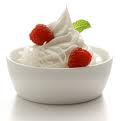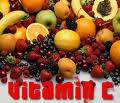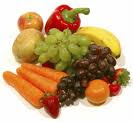With the recent fear of contagious diseases, here is a list of Immune-Enhancing Foods(IEF's) to help you strengthen your immune system and fight against germs and viruses.
Tomatoes

There are a number of foods with a well-deserved reputation for preventing colds and flu, but one of the favorites in my household is tomato soup. In a study published in the American Journal of Clinical Nutrition, volunteers who ate a tomato-rich diet for three weeks sustained 38% less free-radical damage to their infection-fighting white blood cells than they did during a three-week period on a tomato-free diet. Tomatoes are one of the richest sources of lycopene, a plant compound that is a potent free-radical fighter.
Grapefruit 
Share some grapefruit with a loved one in the morning and you'll be in good company in more than one way. Grapefruit, winter squash, asparagus and avocados are rich in glutathione, an important immune system protectant and a specific indicator of health. the higher your glutathione level, the less illness and disease you'll likely have. Glutathione defends white blood cells against free-radical damage. It also stimulates the immune system to release macrophages (literally, "big eaters"). These immune cells wander throughout the body in search of foreign invaders, which they engulf and destroy.
Yogurt 
Yogurt but not milk or other dairy products is another great immune-boosting food. Yogurt contains beneficial bacteria called probiotics, which make their home in your gastrointestinal tract. In addition to overwhelming and pushing out unwanted bugs such as Staphylococcus and Candida albicans, these friendly bacteria manufacture vitamin B6 (pyridoxine), which is the most important B vitamin for immune function. They also increase levels of interferon, one of the most powerful immune-enhancing hormones in your body. According to a study conducted at the University of California at Davis, people who ate yogurt over the course of a year had a lower incidence of coughing, colds and wheezing than those who ate no yogurt during the year. According to research,
individuals eating 2 cups of yogurt daily had 25 percent fewer colds than non-yogurt eaters. In fact, eating 2 cups of yogurt daily for four months resulted in a fourfold increase in the body's immune system protection. And, the protection lasted for two months after the yogurt eating ended. In addition, fermented dairy products, such as yogurt and kefir, contain healthy bacteria that can repopulate the bacteria in your gut and keep harmful germs from invading via your intestinal wall. Since antibiotics can wipe out these good bacteria and leave your body vulnerable to these unwelcome germs, including yogurt daily, when you are taking antibiotics, is a must. For a crunchy and tasty treat that will increase the immune boosting power of yogurt, sprinkle wholegrain cereals and nuts, such as wheat germ and toasted almonds, into your yogurt or kefir.
Brazil Nuts 
"Brazil nuts roasting on an open fire..." isn't exactly a holiday tradition, but if you want to make it through the season of sniffles with a smile on your face, keep a bowl of these on hand for snacks. Brazil nuts are chockfull of selenium, a mighty mineral that functions as a component of glutathione (discussed above) and boosts the activity of white blood cells. It is especially effective in increasing the activity of natural killer cells, the pit bulls of the system. In a study published in the Archives of Internal Medicine, a daily intake of just 100 micrograms of selenium (the amount in one Brazil nut) reduced the risk of respiratory infections in elderly volunteers over a two-year period, outperforming more famous antioxidants like vitamins A, C and E.
Garlic

According to research, one of the most versatile and widely used herbs in the world, garlic, can kill viruses responsible for colds and the flu and stimulate infection-fighting immune cells. Shiitake & Maitake Mushrooms studies show that shiitake and maitake mushrooms, those exotic mushrooms that are now available in the grocery produce section, can also really pack a big immunity punch. You Can saut? Some immune-boosting mushrooms with garlic and really knock off those invaders.
Fruits & Vegetables Keep in mind that too much sugar intake can reduce the immune system cells ability to destroy microorganisms. So, keep it small if you indulge or turn to fruit instead. Increasing antioxidant rich fruits and vegetables that are colorful, including sweet potatoes, citrus fruits, peppers, tomatoes (especially cherry), green leafy vegetables, berries, melons, cabbage and carrots, is essential to immune function.
Vitamins & Minerals

Vitamin is essential for immune function, as it can affect host defenses through functions in metabolism in immune cells, or via its role in epithelial-cell differentiation and host-barrier function. The benefit of vitamin A is widely studied in relation to infection rates of malnourished children. Among its benefits:-
Vitamin-A 
Supplements have been shown to maintain gut integrity, lower the incidence of respiratory tract infections, and reduce mortality associated with diarrhea and measles. One proposed mechanism by which vitamin A exerts its health benefits is through its role in controlling differentiation of epithelial cells.
Vitamin-C 
An essential part of every living cell, is highly concentrated in leukocytes. Studies have found that reduced concentrations of this vitamin are associated with impaired immune function. Some, but not all, studies have found a significant reduction in the incidence of colds with vitamin-C supplementation. In one study of 10 healthy women and 20 women with major depressive disorders or coronary heart disease (72 +/-6years of age), supplementation of 1 gram of vitamin C and 200 mg of daily for 16 weeks resulted in significant increases in immune function(Canadian Journal of Physiology and Pharmacology 76, 373-380, April 1998).
Vitamin-E 
If deficient in vitamin E, increased free-radical-induced damage to red-blood-cell membranes can result. In those with marginal health status and the elderly, studies have found that vitamin-E supplementation improves immune response. Although the optimal intake for immune health is not known, many studies have determined a positive immune effect with 200 to 800 mg/day dosages.
Zinc 
This mineral affects many aspects of immune health. A zinc deficiency may increase susceptibility to a variety of pathogens, thus making it more difficult to fight infection. Zinc is essential for normal development and functioning of neutrophils and natural killer cells. It also helps with production of antibodies and T cells in addition to other white cells.
Fatty Acids 
A diet high in omega-3 fatty acids may enhance immune function. Feeding moderate amounts of long-chain omega-3 PUFAs eicosapentaenoic acid (EPA)and docosahexaenoic acid (DHA) (less than 10% of fat from n-3 PUFA or less than 1 gram EPA plus DHA per day to humans) can enhance immune functions, including lymphocyte proliferation/activation, natural killer-cell activity and macrophage activation, among other functions (Journal of Leukocyte Biology,71:16-32, 2002). A randomized, double-blind, placebo-controlled trial monitored the effect of 2 months of supplementation with black-currant-seed oil high in linolenic fatty acids on 40 healthy subjects age 65 or older. The oil had a moderate immune-enhancing effect, due to its ability to reduce prostaglandin E2 production (American Journal of Clinical Nutrition 70:536-543, 1999). In clinical trials and animal models, fish-oil supplementation has resulted in measurable beneficial effects on the immune system for rheumatoid arthritis, ulcerative colitis, psoriasis and organ transplantation.
The Cure Recipe for SARS Boil Green Bean with Sweet Potatoes plus brown sugar and drink the soup, it helps to clear the toxic in our body cos now Singapore has a lot of people got the flu, pls do take care.
Recipe from a Roman catholic church
Crush half large fresh garlic clove and several slices of ginger root In a cup. Add 1 tablespoon of lemon juice and 1 teaspoon honey. Pour boiling Water and let the mixture set for at least 5 minutes. DO NOT BOIL. Drink one hour before bedtime. If one already has SARS symptoms, drink a cup 3 times a day. A garlic pill or capsule can be substituted if one can't take fresh garlic. Take a few sprigs of fresh parsley to combat garlic breath.
Other Factors
Although a well-balanced, varied and regular diet is critical in keeping the immune system functioning, soothing the soul is just as important. Diet alone cannot accomplish the task of keeping the immune system healthy, but in combination with a good exercise program, lots of prayers (research shows that regular praying people have a better functioning immune system), minimal stress, a positive attitude, and enough good sleep, you can survive the cold and flu season a little bit better. Also remember to drink enough water.
Interview with an Expert
Finally, check out the interview with Dr. T. Saburi, a former Director General of The Japan Foundation of Aging and Health which lists out immune-enhancing foods: Chlorel fungi; algae (e.g. variety of brown algae, sea grape, laver on sea rocks); fermented foods made with beer yeast and those made from milk (e.g. yoghurt and fermented soybeans, called natto); molluscs (e.g. abalone and scallop); vegetables (e.g. yams, carrots, beans and garlic); fruit (e.g. kumquat, jujube and pine nut); green tea; and vegetable oil.
Read more...





































